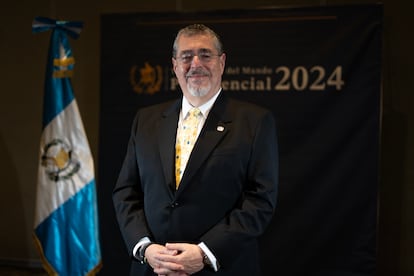Bernardo Arévalo: ‘We are going to close the chapter of brutal corruption’
In an interview with EL PAÍS, the president of Guatemala — who was sworn in on Sunday — discusses the efforts to stop him from taking power and the challenges his government will face


Not a single poll predicted that Bernardo Arévalo would win the presidential elections in Guatemala in July. But on Sunday, the 66-year-old sociologist was sworn in as the country’s new leader. On the eve of the investiture, a large group of advisors and security personnel surrounded the former deputy as he spoke to the media, greeted a TikToker and met with the international delegations that had arrived to attend the investiture ceremony.
His eyes betray the fatigue of his six-month-long battle against the Public Prosecutor’s efforts to disqualify him. But Arévalo — the son of former president Juan José Arévalo (1945-1951) — says he feels “energized.” Since winning the election, the leader of the Seed Movement has been working on his plans for a government that will fulfill his promise of ending corruption in the country. But he has faced constant obstacles from the Public Prosecution, led by Attorney General Consuelo Porras, who Arévalo has accused of attempting a coup.
Before landing unexpectedly on the front line of Latin American politics, Arévalo was recognized for his negotiation skills and experience in conflict resolution — two areas that may help him achieve his difficult goal of fighting corruption and restoring institutional integrity. While he won the presidency, Arévalo faces a hostile judicial system and his party does not hold a majority in Congress.
Guatemala’s president is also aware that the people have high expectations of him, and hopes that they understand that his election promises will be heavily challenged. “The country’s needs are enormous in every area. We are not going to solve them in four years, but we can lay the foundations for a different way of governing, and I think that is what the people will judge,” says Arévalo in an interview with EL PAÍS, the day before his inauguration.
Question. Did you expect the transition to be so difficult?
Answer. No. The six-month transition period has been an obstacle course, in which every morning one got up to see what new atrocity the corrupt had come up with, and it’s not over. We are waiting to see what they do between today [Saturday] and tomorrow [Sunday] at 4 p.m. [Cabinet delayed the investiture ceremony by nine hours.] But it has also been a period where what has been very energizing is to see that precisely these difficulties have catalyzed the will of the Guatemalan people. There has been a strengthening of the conviction that we cannot go back, that there has been an electoral result, that this electoral result means turning the page of history, closing the chapter of brutal corruption and beginning to build the foundations of a democratic society where institutions are effectively at the service of the people.
Q. Your main campaign promise was to fight against corruption. How exactly is this going to happen? You have spoken of creating a National Anti-Corruption Commission...
A. It will not be a government commission that is subordinate to the president or anyone else; it will be autonomous. There will be government officials, but also civil society officials who will form the majority to avoid suspicion. The task of the National Anti-Corruption Commission will be to advance the construction of a national anti-corruption system through, on the one hand, the design of mechanisms and strategies that serve to put a stop to the corrupt practices that exist in the different areas of public institutions and, on the other hand, to monitor the action of institutions of all powers, the executive branch in particular, to ensure that the objectives of promoting transparency and fighting corruption are effectively being met.
Q. In the case of Consuelo Porras, you have been very clear: you are going to ask for her resignation, but it is very likely that she will resist. What mechanisms do you plan to implement if that happens?
A. We are examining what legal avenues we have so that, in the event that she does not want to resign, we can move forward to remove her from that role.
Q. When presenting the members of your Cabinet, you recognized that you have a debt with the Indigenous communities. But only one minister out of 14 is Indigenous, even though their mobilizations have been key to your investiture. Why has it been so difficult to include them in the Cabinet, and how is your government going to try to repay that debt?
A. Firstly, we recognize the debt. Secondly, we have several Indigenous vice ministers and secretaries. The problem is there are structural reasons that are limiting. Historical discrimination and the denial of education access that exists and affects Indigenous peoples has meant that the availability of Indigenous professionals is lower than in the rest of the population. On the other hand, there is also no knowledge of their availability, so what we have started to do is to build a bank of Indigenous professionals, but we have done it in dialogue with the Indigenous leadership to start identifying those people who can fill these positions.
Q. Another criticism of the Cabinet is that some ministers are linked to Cacif, Guatemala’s main business chamber. Has there been any change in your vision of the relationship with private enterprise since you won the election, any kind of negotiation?
A. There has been no negotiation...
Q. Dialogue?
A. We have had dialogues with Cacif, with business organizations that are not part of Cacif, with peasant organizations, with Indigenous organizations, with women’s organizations... We have opened a dialogue process with sectors so that the decisions we are making do not result from negotiations that are traditionally done. What we have done is to select those who come from different areas based on their experience and, in the areas where we have identified people with private sector experience, it is because they have the necessary experience and the necessary capacity to do [the job] now.
Q. Given the legal efforts to disqualify your party, has it been difficult for you to form a Cabinet? Have many people said no to you, perhaps out of fear of persecution?
A. Lots of people, from all kinds of backgrounds. We have had candidacies for vice ministers, candidacies for Indigenous vice ministers, who have told us no. It’s widespread. It’s not easy to say yes to a Cabinet offer in a government that comes with important challenges.
Q. The role of the international community has also been very important in condemning the judicial interference in the transfer of power. What do those countries now expect from you, for example, in the case of the United States?
A. What they expect from us is behavior consistent with our commitment to the democratic system. What we need is to create institutions that effectively fulfill their function and that, then, begin to address the development challenges that correspond to them. The United States, for example, is very interested in a real commitment to the fight against drug trafficking, which is almost impossible in a government that is undermined by corruption. Border countries want to talk about issues such as migration and are interested in seeing that a government that is indeed not willing to surrender to the human trafficking networks that are operating. I believe that we have had such broad and varied international support, ideologically speaking, that it shows that what has been happening in Guatemala has been clearly identified as a fight for democratic institutions.
Sign up for our weekly newsletter to get more English-language news coverage from EL PAÍS USA Edition
Tu suscripción se está usando en otro dispositivo
¿Quieres añadir otro usuario a tu suscripción?
Si continúas leyendo en este dispositivo, no se podrá leer en el otro.
FlechaTu suscripción se está usando en otro dispositivo y solo puedes acceder a EL PAÍS desde un dispositivo a la vez.
Si quieres compartir tu cuenta, cambia tu suscripción a la modalidad Premium, así podrás añadir otro usuario. Cada uno accederá con su propia cuenta de email, lo que os permitirá personalizar vuestra experiencia en EL PAÍS.
¿Tienes una suscripción de empresa? Accede aquí para contratar más cuentas.
En el caso de no saber quién está usando tu cuenta, te recomendamos cambiar tu contraseña aquí.
Si decides continuar compartiendo tu cuenta, este mensaje se mostrará en tu dispositivo y en el de la otra persona que está usando tu cuenta de forma indefinida, afectando a tu experiencia de lectura. Puedes consultar aquí los términos y condiciones de la suscripción digital.








































